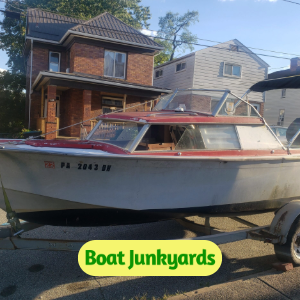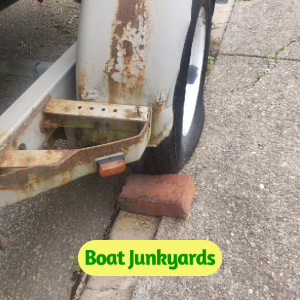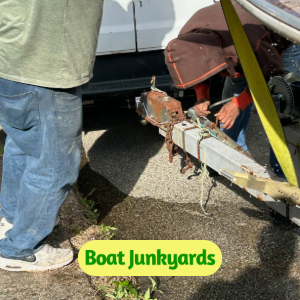Boat Junkyards – Junk Boat Disposal
Is your boat falling apart, rusting away, taking up valuable space, at a storage facility, on a dock, slip, or at a marina, in the water sinking or sunken? If you’re looking for a service to dispose of your boat or sailboat in any condition good or bad anywhere in Pennsylvania, or Allegheny County then reach out to Boat Junkyards. We’d be happy to assist you with all your boat removal, and marine salvage needs.
Marine Salvage, Tarentum, Pennsylvania Junk Boat Removal

Ready to Dispose of a Boat? Contact Boat Junkyards Below
Broken Boat Trailer Removal Pennsylvania

Junk Boat Waste, Hauling & Dismantle

Tarentum Boat Removal & Salvage

Junk Boat Pickup, Removal & Salvage Process with Boat Junkyards
Preliminary Estimation Factors
The process of boat pickup transport typically begins with an initial assessment of the vessel’s condition, location, and accessibility.
The first thing customers must do before getting an accurate quote for boat removal is to simply fill out a form on our website. Without knowing the boats’ location and information we can’t properly estimate the cost of removing or disposing of your boat.
Our team of salvage operators concentrate on marine towing by water, and transport by land. We evaluate the circumstances surrounding the vessel, including the extent of damage (if any), the presence of environmental hazards or oil and fuel leaks, and our logistical liaisons delve into any challenges of retrieval to ensure an efficient boat removal experience. Boat Junkyards preliminary assessment starts the development of a plan for safely retrieving and transporting the boat from its current location to a designated destination on land.
Boat Junkyard Planning and Gearing Up for the Job
Once the boat removal assessment is complete, preparations are made for the boat pickup transport operation.
This may involve mobilizing specialized equipment such as towboats, salvage vessels, cranes, winches, and towing rigs tailored to the size and condition of the vessel. Salvage operators coordinate logistics, assemble necessary tools and materials, and ensure compliance with regulatory requirements governing salvage operations, safety protocols, and environmental protection measures.
On-Water Retrieval & Salvage
Boat pickup and removal operations with Boat Junkyards will typically involve on-water retrieval techniques to carefully extract the vessel from its current location in the water.
Salvage operators employ a mixture of techniques and equipment to stabilize, tow, or lift the boat, depending on factors such as the vessel’s size, condition, and accessibility. This may include attaching tow lines, deploying floating devices, or using cranes and hoists to lift the boat onto a salvage vessel or towing rig for transport to shore.
Shore Towing & Transport
Once the boat is secured and stabilized for transport, it is towed or transported to shore using specialized vessels or towing rigs.
Salvage operators navigate the vessel through waterways, channels, and harbors, ensuring safe passage and minimizing the risk of further damage or environmental impact. Towing vessels may employ propulsion systems such as engines, propellers, or thrusters to maneuver and control the boat’s movement, while towing rigs utilize winches, cables, and towlines to tow the vessel to its destination on land.
Offloading and Disposal
Upon reaching shore, the salvaged boat is offloaded and transferred to a designated location determined by Boat Junkyards for dismantle, disposal, recycle, repair, or salvage.
Our salvage team will coordinate with haul-outs, boatyards, marinas, salvage yards, repair facilities, or disposal sites to facilitate the offloading and disposal process. Depending on the vessel’s condition and the owner’s preferences, the boat may go through further assessment, repair, refurbishment, or dismantling, or it may be disposed of in accordance with environmental regulations and disposal guidelines.
Salvaged Boat Destinations
Salvage Yards and Recycling Centers
Salvaged boats that are deemed unsalvageable or beyond repair may be transported to salvage yards or recycling centers for dismantling, recycling, and disposal. Salvage yards specialize in dismantling and recycling vessels, salvaging valuable components, materials, and equipment for reuse or recycling.
Salvage operators separate engine blocks, electronics, recyclable materials such as metal, glass, and plastic from the vessel’s hull, disposing of non-recyclable materials in accordance with environmental regulations and waste management requirements every facility is different and usually has different prerequisites to dumping boats.
Disposal Sites, Waste Centers & Landfills
Salvaged boats that are unfit for repair, refurbishment, or recycling may be transported to disposal sites or landfills for environmentally responsible disposal. Disposal sites and landfills accept and process salvaged vessels, disposing of non-recyclable materials and hazardous waste in compliance with local, state, and federal regulations.
Boat Junkyards will coordinate with waste management authorities and disposal facilities to ensure proper handling and disposal of salvaged boats, minimizing environmental impact and pollution.
Boat Repair
Although a rare option in the boat salvage arena, due to the return on investment factor. The cost of transporting, storing, and repairing a boat – especially an old boat is usually not feasible.
However, in some scenarios, salvaged boats in need of repair or refurbishment that have value may be transported to a boat repair facilities or marine maintenance shop for assessment, estimation, and repair services. Boat repair facilities specialize in repairing hull damage, structural defects, mechanical failures, and cosmetic issues, restoring salvaged vessels to seaworthy condition. Marine professionals at repair facilities perform a range of services, including fiberglass repair, welding, painting, engine maintenance, and electrical work.
Salvage Auctions and Sales
Salvaged boats in salvageable condition may be sold or auctioned off through salvage auctions or sales events.
Salvage auctions offer salvaged vessels to buyers, salvage operators, dealers, and enthusiasts at discounted prices, allowing them to purchase and refurbish salvaged boats for personal or commercial use. Salvage sales events may be held online or in-person, providing opportunities for buyers to acquire salvaged boats at competitive prices and participate in the salvage industry.
Factors Influencing the Costs of Boat Pickup Transport and Haul-Off Services
Boat Size and Condition
The size and condition of the salvaged vessel significantly influence the costs of pickup transport and haul-off services.
Larger vessels require more labor, equipment, and resources to retrieve, transport, and dispose of, resulting in higher overall costs. Additionally, vessels with extensive damage, structural defects, or environmental contamination may incur additional expenses for specialized equipment, materials, and disposal procedures.
Boat Distance and Location on the Water
The distance and location of the salvaged vessel from shore can impact the costs of pickup transport and haul-off services.
Retrieving and transporting vessels from remote or inaccessible locations may require additional time, fuel, and logistical support, resulting in higher transportation costs. Salvage operators must consider factors such as navigational hazards, distance, weather conditions, and waterway restrictions when planning and executing pickup transport operations. Take into consideration most tow boats tow at a rate of 5-6 nautical miles per hour. Also consider that the tow boat operator will have time spent driving and dispatching the tow boat and trailer by land, then water. After reaching the disposal, haul-out, or boat ramp destination the tow boat team has to return, and the salvage team has to stay with the boat to finish the transport or disposal process.
Boat Transportation Techniques & Equipment Used
The transportation method and equipment used for pickup transport and haul-off services can affect costs and pricing.
Salvage operators utilize a variety of vessels, towing rigs, cranes, and equipment to retrieve, tow, and transport salvaged boats from water to land. The choice of transportation method depends on factors such as the vessel’s size, condition, and location, as well as operational requirements, safety considerations, and environmental regulations.
Labor and Personnel Costs
Labor and personnel costs are significant elements of boat pickup transport and haul-off services, covering the wages of salvage technicians, boat operators, divers, and support staff involved in the retrieval, transportation, and disposal process.
Salvage operators may charge hourly rates, daily rates, or project-based fees for labor and personnel services, depending on the complexity and duration of the salvage operation.
Environmental Compliance and Permitting
Environmental compliance and permitting requirements can impact the costs of boat pickup transport and haul-off services, particularly for salvage operations involving hazardous materials, pollution prevention measures, and environmental remediation.
For wide load, and large yachts and boats salvage operators must obtain necessary permits, licenses, and approvals from regulatory agencies to conduct salvage activities legally especially for road transport. Costs may include fees for permit applications, environmental assessments, waste disposal, and pollution control measures.
Price Estimates for Boat Pickup Transport and Haul-Off Services
Basic Pickup Transport
The cost of basic boat pickup disposal or removal services from land for small to medium-sized boats typically ranges from $500 to $2,000 or more, depending on factors such as the boat’s size, condition, and location.
Basic pickup transport services include retrieval, towing, and transportation of the salvaged vessel from water to land, using standard towing vessels, equipment, and procedures.
Specialized Equipment and Services for Boat Salvage
In some scenarios, salvage operations involving specialized equipment, such as cranes, winches, and lifting devices, may incur additional expenses for equipment rental, usage fees, and personnel costs.
The cost of specialized equipment and services for pickup transport and haul-off operations can vary widely depending on factors such as equipment availability, rental rates, and operational requirements.
Extended Distance and Location Charges
Salvage operations conducted in remote or inaccessible locations may be subject to distance and location surcharges, reflecting the additional time, fuel, and logistical support required for boat removal, and retrieval and transport.
Distance and location surcharges may vary depending on factors such as the distance traveled, navigational challenges, and environmental conditions.
Environmental Compliance Costs
Salvage operations involving hazardous materials, pollution prevention measures, and environmental remediation may incur additional expenses for environmental compliance and permitting.
Environmental compliance costs can include fees for permit applications, environmental assessments, waste disposal, and pollution control measures, depending on regulatory requirements and site-specific conditions.
Additional Services and Fees
Additional services and fees associated with pickup transport and haul-off operations may include storage fees, disposal fees, salvage fees, and administrative charges.
Salvage operators may itemize these fees separately or include them in the overall pricing structure for pickup transport and haul-off services.
Boat Junkyards – Top Cities Near Tarentum, Pennsylvania We Serve
Allison Park, Aspinwall, Avalon, Bairdford, Bakerstown, Baldwin, Bell Acres, Bellevue, Ben Avon, Ben Avon Heights, Bethel Park, Blawnox, Boston, Brackenridge, Braddock, Braddock Hills, Bradford Woods, Brentwood, Bridgeville, Carnegie, Carnot-Moon, Castle Shannon, Chalfant, Cheswick, Churchill, Clairton, Clinton, Coraopolis, Crafton, Curtisville, Dormont, Dravosburg, Duquesne, East McKeesport, East Pittsburgh, Edgewood, Edgeworth, Elizabeth, Emsworth, Enlow, Etna, Forest Hills, Fox Chapel, Franklin Park, Gibsonia, Glassport, Glen Osborne, Glenfield, Glenshaw, Green Tree, Greenock, Harwick, Haysville, Heidelberg, Homestead, Imperial, Ingram, Jefferson Hills, Leetsdale, Liberty, Lincoln, McDonald (mostly in Washington County), McKees Rocks, McKeesport, Millvale, Monroeville, Mount Oliver, Mt. Lebanon, Munhall, Noblestown, North Braddock, North Versailles, Oakdale, Oakmont, Penn Hills, Pennsbury Village, Pitcairn, Pittsburgh, Pleasant Hills, Plum, Port Vue, Rankin, Rennerdale, Ross, Rosslyn Farms, Russellton, Sewickley, Sewickley Heights, Sewickley Hills, Sharpsburg, South Park, Springdale, Sturgeon, Swissvale, Tarentum, Thornburg, Trafford (mostly in Westmoreland County), Turtle Creek, Verona, Versailles, Wall, West Elizabeth, West Homestead, West Mifflin, West View, Whitaker, White Oak, Whitehall, Wilkinsburg, Wilmerding

